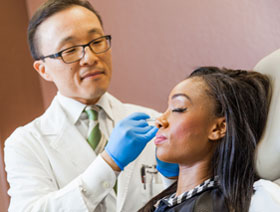 Congratulations on your pregnancy! So much is about to change. But perhaps you didn’t realize your skin would, too.
Congratulations on your pregnancy! So much is about to change. But perhaps you didn’t realize your skin would, too.
Not everyone experiences skin changes during pregnancy, but they aren’t uncommon. Melasma, stretch marks, acne, and the linea nigra are a few skin changes you might experience over the next nine months. We’ll discuss how to recognize these changes and how to best take care of your skin, safely, during pregnancy.
Understanding Pregnancy-Related Skin Issues
Melasma (Chloasma):
Melasma, often referred to as the “mask of pregnancy,” is a common skin concern during pregnancy. It manifests as dark, pigmented patches on the face, particularly on the cheeks, forehead, and upper lip. These patches result from hormonal changes that stimulate the melanocytes in your skin, leading to increased pigmentation. (Note: melasma can also occur as a result of taking hormonal treatments, such as birth control pills.) Melasma during pregnancy usually fades on its own within a few months of giving birth.
Here are some tips for managing pregnancy-related melasma.
Tip 1: Sun Protection is Key
To manage melasma, the first line of defense is diligent sun protection. Arizona’s sun can be harsh, and UV rays can exacerbate melasma. Wear a broad-spectrum sunscreen with at least SPF 30 daily, even on cloudy days. Invest in wide-brimmed hats and sunglasses to shield your face from the sun.
Tip 2: Gentle Cleansing and Exfoliation
Choose a gentle cleanser and exfoliate your skin regularly to remove dead skin cells, promoting a more even skin tone. Exfoliating ingredients like citric, glycolic, and lactic acids are considered safe for pregnant women. If you have concerns, talk to one of our dermatologists.
Tip 3: Treatments
Your melasma should resolve on its own after the birth of your baby, but if it really bothers you, we can help. There are safe treatments that can help manage melasma. Avoid bleaching creams and products containing hydroquinone or salicylic acid. In fact, it’s not worth it playing the guessing game on your own. Come see one of our dermatologists, who can make safe recommendations.
Note: Changes related to the melanin in your skin are also responsible for the linea nigra—a dark vertical line that appears on the stomach during pregnancy. About 80% of pregnant women will develop a linea nigra as a normal part of their pregnancy, and the line will go away on its own as hormone levels adjust after birth. There is no need to treat the linea nigra and it is not recommended to use bleaching creams or exfoliation to try to lighten it. Just accept this as another temporary change in your body during this unique time.
Stretch Marks (Striae Gravidarum):
Stretch marks are another common concern during pregnancy. These pink or purple streaks occur when the skin stretches rapidly due to weight gain and hormonal changes, affecting areas like the abdomen, breasts, hips, and thighs. While genetics play a role, proper skincare can help minimize their appearance.
Tip 1: Hydration
Keep your skin well-hydrated by drinking plenty of water and using moisturizers rich in ingredients like shea butter, cocoa butter, and vitamin E. Applying moisturizer regularly can improve the skin’s elasticity and reduce the likelihood of stretch marks.
Tip 2: Body Oils
Consider using natural oils like coconut oil, almond oil, or argan oil to massage your skin gently. Massaging can improve blood circulation and help your skin stretch more comfortably.
Tip 3: Topical Creams
There are several over-the-counter creams and lotions formulated specifically for stretch mark prevention. Always consult one of our dermatologists before using any products during pregnancy to ensure they are safe for you and your baby.
Acne During Pregnancy
Acne during pregnancy is often attributed to hormonal fluctuations, particularly increased levels of androgens, which can lead to overactive oil glands and clogged pores. While some women may experience a noticeable improvement in their skin during pregnancy, others may find that their acne worsens. Many acne treatments are considered safe during pregnancy, but it’s essential to consult with your dermatologist to determine the best approach. (Note: patients who are taking Accutane should not become pregnant as this medication causes severe birth defects when taken during pregnancy.) Talk to your doctor right away about your acne medication if you become pregnant.
Tip 1: Gentle Cleansing
Opt for a mild, fragrance-free cleanser to wash your face twice daily. Avoid harsh or abrasive scrubs, as they can irritate the skin and exacerbate acne. Gentle cleansing helps remove excess oil, dirt, and impurities without stripping the skin of its natural moisture.
Tip 2: Topical Treatments
Consult with your dermatologist for pregnancy-safe topical treatments. They may recommend ingredients like glycolic acid, lactic acid, or benzoyl peroxide in lower concentrations to help manage acne. It’s essential to use products that are specifically approved for use during pregnancy, as some acne medications may not be safe for the baby.
Tip 3: Hydration and Sun Protection
Keep your skin hydrated by using a non-comedogenic moisturizer. Hydrated skin is less likely to produce excess oil. Additionally, apply a broad-spectrum sunscreen with at least SPF 30 daily, even on cloudy days, to protect your skin from UV damage. Some acne treatments can make your skin more sensitive to the sun, so sun protection is crucial to prevent further skin issues.
General Skincare Tips for Pregnancy
In addition to addressing specific skin concerns, here are some general skincare tips to keep your skin healthy and glowing during pregnancy:
- Stay Hydrated: Proper hydration is essential for maintaining skin elasticity and overall health. Drinking water helps flush toxins from your body, keeping your skin clear.
- Balanced Diet: A well-balanced diet rich in vitamins, minerals, and antioxidants is beneficial for your skin. Foods like fruits, vegetables, and nuts can contribute to a healthy complexion.
- Gentle Cleansing: Use a mild, fragrance-free cleanser to avoid irritation. Avoid harsh exfoliants and abrasive scrubs, especially if your skin becomes more sensitive during pregnancy.
- Regular Exercise: Engaging in safe and moderate physical activity can improve circulation and contribute to healthy skin. Consult your healthcare provider for exercise recommendations during pregnancy.
- Adequate Rest: Get plenty of rest to allow your body to regenerate and heal. Sleep is crucial for maintaining healthy skin.
- Stress Management: High stress levels can exacerbate skin issues. Practice relaxation techniques such as meditation, deep breathing, or yoga to keep stress in check.
- Consult a Dermatologist: If you experience severe skin issues or have concerns about any changes in your skin, don’t hesitate to consult one of our dermatologists. They can provide personalized advice and treatments tailored to your needs.
At Arizona Dermatology, we believe that taking care of your skin during pregnancy is not only about addressing specific concerns like melasma and stretch marks but also about embracing the journey and feeling confident in your skin. By following these tips and consulting with your dermatologist when needed, you can maintain healthy, radiant skin throughout your pregnancy, leaving you with a beautiful glow that reflects this very special time in your life.


